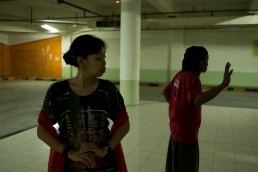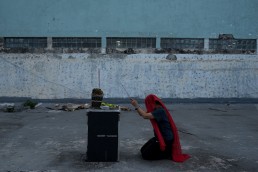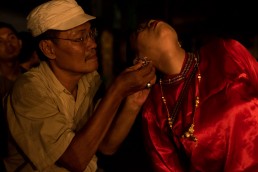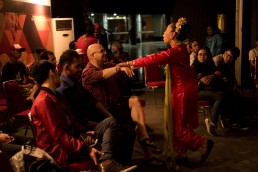Cokek, The Entertainer
COKEK, THE ENTERTAINER
Anggara Mahendra, a contributor to Bali Buzz (The Jakarta Post Group)
In 1940s, cokek was an entertainment only for the privilege of upper middle class people among the Cina Benteng (Ethnic Chinese living in Benteng area), Tangerang, Banten. Nowadays, everybody can get entertained by the singers-dancers due to an adaptation process as an impact of both modernization and a revocation of the ban against Chinese cultural practices stipulated through a Presidential Instruction No.14 in the year 1967 during the New Order era.
The term cokek is originated from a Chinese Hokkian dialect, namely chiou-khek. Chiou means to sing, and khek means a certain kind of song in Hokkian culture. This art form, which is a combination of Betawi (native Jakartan) and Chinese culture, is always performed with gambang kromong group for a musical accompaniment.
A cokek sings various Dalem songs (whose lyrics in a form of rhyming poem in Malay) and Sayur songs (sung to accompany joget dance). Back then, cokek was one of the social status symbols for ethnic Chinese leaders, preventing nobodies from making a pass at any cokek.
This Cina Benteng entertainment has remained existed up to now, yet it has evolved into a new form. Gambang Kromong musical group and cokeks find their new stage when they entertain people in a wedding hall (a rental hall for ciotao or a wedding reception in Cina Benteng tradition).
Electric guitars, keyboards and big loud speakers are the sign of its new modern form in an effort to adapt with the changing people’s preference in the midst of emerging personalized entertainment forms available via mobile phones. Singers take over cokeks’ role in singing and sing various songs whose genre ranging from traditional gambang to modern dangdut, while the cokeks themselves are busy pair dancing or ngibing with any guests.
Meanwhile, Herlina Syarifudin, a film director, a script writer and theater artist, tries to portray the story of cokek in a monologue titled “Tumbal Dewi Cokek” or “The Charm of Cokek Goddess”.
“I tend to be interested in any traditional art now in the brink of extinction caused by the changing of time and influences of foreign culture. At least, I could record it as a part of my artistic journey in a theater world and to retell the story to our children and grandchildren,” said Herlina, who dedicates her work to the late Mak Masnah, a cokek maestro who died at age 90s in 2014.





